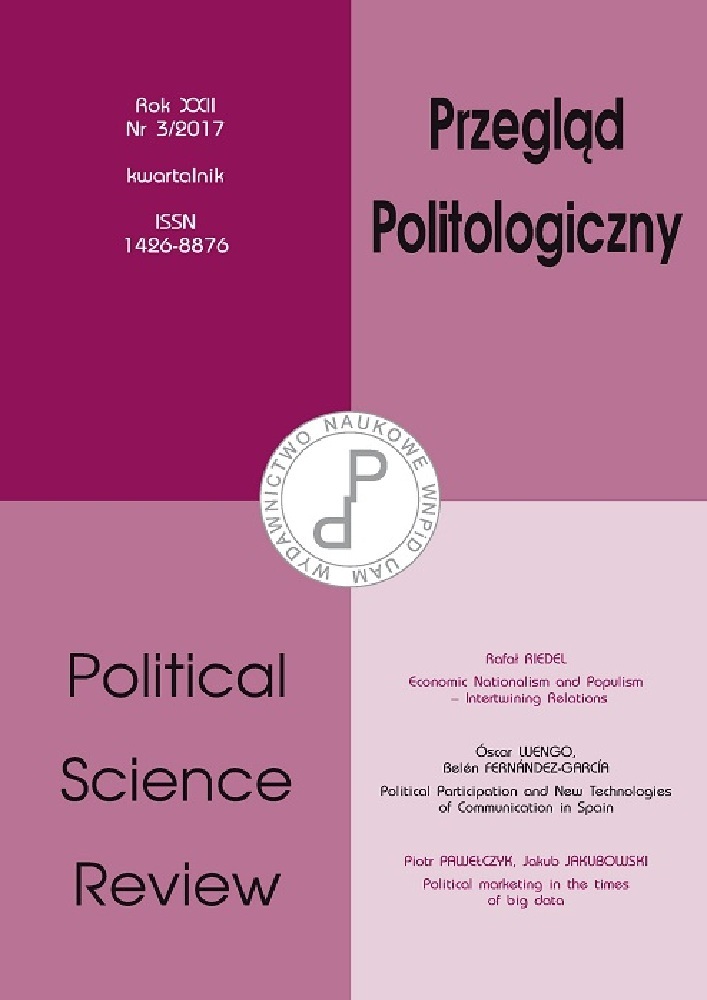Abstrakt
Celem niniejszego artykułu jest zaprezentowanie analizy dwóch, bardzo ściśle powiązanych ze sobą kategorii, nacjonalizmu ekonomicznego oraz ekonomicznego populizmu. Obie kategorie przenikają się zarówno w realnej polityce, jak i w refleksji akademickiej. Mimo bardzo bogatego dyskursu naukowego na temat obydwu, ich badacze cały czas spierają się nie tylko na temat tego jak je wyjaśniać, ale nawet co do ich zasadniczych treści. Zaproponowana analiza stanowi odpowiedź na ten deficyt i próbuje skupić się na związkach ekonomicznego populizmu i nacjonalizmu. W pierwszej kolejności dokonana została rekonstrukcja podstawowych sposobów rozumienia nacjonalizmu ekonomicznego – jego elementów konstytutywnych, jego historyczności, periodyzacji, jak również podstawowych kategoryzacji. Następna część koncentruje swoją uwagę na populizmie, eksponując jednocześnie jego wymiar ekonomiczny. W części konkludywnej, podobnie jak w całym tekście, autor uwypukla zachodzące relacje pomiędzy nacjonalizmem i populizmem ekonomicznym, ich wzajemnie nachodzące na siebie elementy oraz elementy rozbieżne. Początki populizmu (jako ruchu) były z natury ekonomiczne. Populizm ekonomiczny (jako swego rodzaju “pusta” ideologia) przenika nacjonalizm, kreując wiele z jego współczesnych (re)inkarnacji. Zarówno ekonomiczny populizm, jak i nacjonalizm gospodarczy stają się coraz bardziej istotnymi kategoriami analitycznymi, w związku z rosnącym znaczeniem sił nacjonalistycznych i populistycznych, i z tego powodu wymagają zaawansowanej refleksji naukowej.
Bibliografia
Aslanidis P. (2015), Is Populism an Ideology? A Refutation and a New Perspective, “Political Studies”, pp. 1–17.
Baughn C. C., Yaprak A. (1996), Economic Nationalism: Conceptual and Empirical Development, “Political Psychology”, no. 17 (4), pp. 759–778.
Berend I. (2000), The Failure of Economic Nationalism. Central and Eastern Europe Before World War II, “Revue economique”, no. 51 (2), pp. 315–322.
Berlin I. (1968), To Define Populism, “Government and Opposition”, no. 3 (2), pp. 137–197.
Black D. J. (1928), The McNary-Haugen Movement, “The American Economic Review”, no. 3, vol. XVIII, pp. 405–427.
Dornbusch R., Edwards S. (1991), The Macroeconomics of Populism in Latin America, Chicago.
Freeden M. (1998), Is Nationalism a Distinct Ideology?, “Political Studies”, no. 46 (4), pp. 748–765.
Gilpin R. (1987), The Political Economy of International Relations, Princeton.
Helleiner E. (2002), Economic Nationalism as a Challenge to Economic Liberalism. Lessons from the 19th Century, “International Studies Quarterly”, no. 46, pp. 307–329.
Wendy I.-M. (2011), National Identity and Economic Nationalism. Can an Economic Perspective Reinforce Nationalism and Nation Building?, “Africa Insight”, no. 41 (1), pp. 59–70.
Jansen S. R. (2011), Populist Mobilisation: A New Theoretical Approach to Populism, “Sociological Theory”, no. 29 (2), pp. 75–96.
Keane J. (1994), Nations, nationalism and citizens in Europe, “International Social Science Journal”, no. 4, pp. 169–184.
Kluknavska A. (2014), Enemies among us: The anti-elitist and xenophobic discourses in the Czech Republic and Slovakia, “Rexter – casopis pro vyzkum radikalismu, extremismu a terrorismu”, no. 2, pp. 42–71.
Kubik J. (2012), Illiberal Change to Liberal Democracy. The Case of Poland, “Taiwan Journal of Democracy”, no. 8 (2), pp. 79–89.
List F. (1904) The National System of Political Economy, translated by S. Lloyd, London.
Mielina I., Koroleva I. (2015), Supporters for far right ideology and anti-migrant attitudes among youth in Europe: A comparative analysis, “The Sociological Review”, no. 63 (2), pp. 183–205.
Moffit B., Tormey S. (2014) Rethinking Populism: Politics, Mediatisation and Political Style, “Political Studies”, no. 62, pp. 381–397.
Mudde C. (2001), In the Name of the Peasantry, the Proletariat and the People: Populism in Eastern Europe, “East European Politics and Societies” March, p. 33–53.
Mudde C. (2004), The Populist Zeitgeist, “Government and Opposition, no. 39 (4), pp. 542–543.
Mudde C., Kaltwasser C. (eds.) (2012), Populism in Europe and the Americas, Threat or Corrective for Democracy, Cambridge University Press.
Mueller J.-W. (2015), Parsing populism. Who is and who is not a populist these days?, “Juncture”, no. 22 (2), pp. 80–89.
Nakano T. (2004), Theorising economic nationalism, “Nations and Nationalism”, no. 10 (3), pp. 211–229.
Natvik G., Torvik R. (2016), Petro-Populism, “Journal of Development Economics”, no. 118, pp. 1–12.
Nicholson P. S. (2012), Who’s the Party of the People? Economic Populism and the U.S. Public’s Beliefs About Political Parties, “Political Behaviour”, no. 34, pp. 369–389.
Pereira B. L., Dall’Acqua F. (1991), Economic populism versus Keynes: reinterpreting budget deficit in Latin America, “Journal of Post Keynesian Economics”, no. 14 (1), pp. 29–38.
Pryke S. (2012), Economic Nationalism: Theory, History and Prospects, “Global policy”, no. 3 (3), pp. 281–291.
Rooduijn M., van der Burg W., de Lange S. (2016), Expressing or fuelling discontent? The relationship between populist voting and political discontent, “Electoral Studies”, no. 43, pp. 32–40.
Rupnik J. (2007), From Democracy Fatigue to Populist Backslash, “Journal of Democracy”, no. 18 (4), pp. 17–25.
Shulman S. (2000), Nationalist Sources of International Economic Integration, “International Studies Quarterly”, no. 44, pp. 365–390.
Srinivasan S. (2014), Economic populism, partial deregulation of transport fuels and electoral outcomes in India, “Energy Policy”, no. 68, pp. 465–475.
Stavrakakis Y. (2014), The Return of the “People”: Populism and Anti-Populism in he Shadow of the Europea Crisis.
Taggart P. (2004), Populism and representative politics in contemporary Europe, “Journal of Political Ideologies”, no. 9 (3).
Taggart P., Kaltwasser R. C. (2016), Dealing with populists in government: some comparative conclusions, “Democratisation”, no. 23 (2), pp. 345–365.
Weiss H. (2003), A Cross-National Comparison of Nationalism in Austria, the Czech and Slovac Republics, Hungary and Poland, “Political Psychology”, no. 24 (2), pp. 377–401.
Wills J. (2015), Populism, localism and the geography of democracy, “Geoforum”, no. 62, pp. 188–189.
